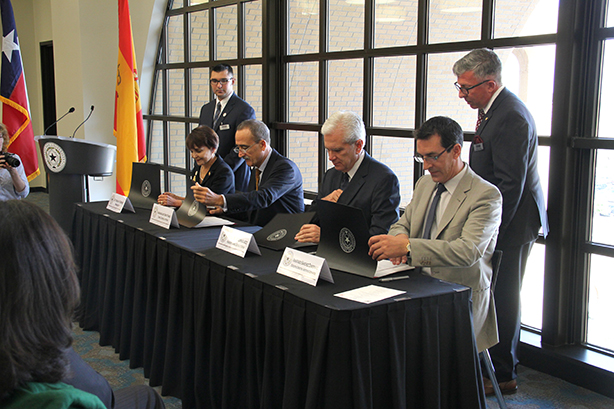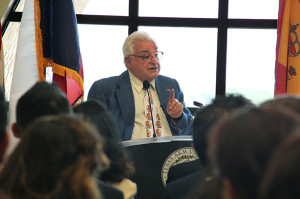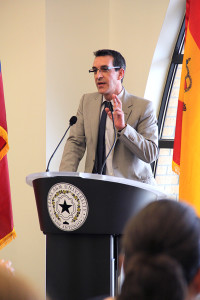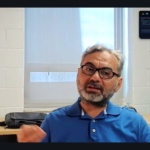
By Emily Rodriguez
A 14-month long effort came into fruition Monday when Texas A&M University-San Antonio signed a partnership to bring spanish learning opportunities to the community.
The memorandum of understanding was signed with Instituto Cervantes, the largest institution in the world dedicated to teaching Spanish, during a press conference Monday.
President Maria Hernandez Ferrier, Eric Panés, consul general of Spain in Houston, Raul Rodriguez, honorary consul general of Spain in San Antonio, and Anastasio Sanchez Zamorano, executive director of Instituto Cervantes Albuquerque, signed the understanding between the two institutions.
The memorandum allows students to learn Spanish and provides opportunities for developing academic exchange programs for both students and faculty, including research projects, collaborations and seminars, while designating A&M-San Antonio as an examination for Diplomas of Spanish as a Foreign Language (DELE).
Community stakeholders involved in the long process of bringing the institute to San Antonio came to show their support.
During his remarks, Dr. Alfonso Chiscano, a cardiovascular surgeon, described how he worked to bring the organization to San Antonio since 1991 but his attempts were unsuccessful because of funding and location issues.

Chiscano, a native of the Canary Islands, has vested himself in educational, cultural, trade, and development exchanges and the formation of Friends of the Canary Islands Association.
In fall 2013, Douglas Carter, associate vice president for external relations and global partnerships, was at a trade mission with Chiscano when he was asked by Ferrier to inquire about bringing the institute to A&M-San Antonio.
Several deans met with the director general of Instituto Cervantes to discuss the possibilities of creating an aula, which means classroom in Spanish. As interest grows within the community, the aula, or introductory level classroom, can evolve to a full institute.
“I’m excited about the possibilities with Cervantes because we can continue to grow. We can move to a full institute when we have the resources and the network that will support it,” Carter said. “We have been approached by other countries to do something similar with our limited resources and with our size it’s best to work with Spain.”
As part of the agreement, students and members of the community can enroll in DELE courses at the university. Community members can enroll through the institute and take classes on this campus.The only internationally recognized certification signifies fluency in the Spanish language.
Carter said that online courses will begin in June and the program in fall 2015.
“Our students will be able to take continuing education classes to improve their Spanish,” president Maria Hernandez Ferrier said in an interview following Monday’s press conference. “It’s going to affect our students as we bring more culture from Spain and for students to understand their Spanish roots.”
Two Spanish instructors from the institute will arrive before the end of the semester to work with the deans of each college to integrate programing into their curriculums.
“Being bilingual brings important benefits. It opens the mind to the learning of other languages and I’m sure that knowing better Spanish language and being familiar with Spanish culture will also stimulate the eagerness of your students to go deeper into the knowledge of foreign language,” Panés said Monday.
Ferrier and the administration are committed to expand international relations, particularly with Spain by drawing from Texas’ history.

“I think it expands our horizons and expands our exposure so we are not operating out of a vacuum,” Carter said. “The earlier we can expose our students to global collaborations and partnerships, the better they will understand the environment in which they are going to be working in.”
There was frequent mention by speakers that Instituto Cervantes would not be in direct competition with other language institutes, including Universidad Nacional Autónoma de México (UNAM) and Universidad Autónoma de Guadalajara.
“We’re not going to compete with them we’re going to try offer to the community something that they’re not offering. Something that fulfills the needs of the community and anything the institution will need,” Sanchez said Monday.
“Instituto Cervantes will be the bridge between worlds, Europe and the USA and the USA with Latin America,” he continued.





